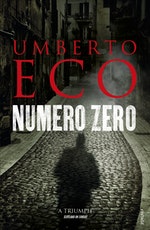

Commissioned by Editor-in-Chief Simei, he’s informed from the outset that Domani is merely an excuse for its owner (“Commendatore Vimercate”) to smear his opponents and threaten his way into “the inner sanctum of finance, banking and hopefully even the quality papers.” The plan is to shut it down after its run of 12 “zero” issues have worked their slanderous magic, and even though its uninformed editorial staff will be employed to fabricate sensationalist drivel, Colonna is tasked with penning a memoir that will recount how it “failed because it was impossible to have a free voice” and be scrupulously objective in late-20th-Century Italy.

It all starts when the middle-aged Colonna - a college-dropout and occasional German translator - is approached to ghostwrite a book about a soon-to-be-launched newspaper, Domani (Italian for ‘tomorrow’). Even if its 18 chapters comprise the leanest novel in the Eco canon (which some will undoubtedly view as a good thing), and even if it’s a touch underdeveloped in certain aspects, its taut cabbalistic intrigues plunge the murkiest depths of post-WWII Italy and the West. Set in 1992, as the Cold War subsided into a fool’s peace and the Italian political system was decimated by corruption scandals, it chronicles struggling hack Colonna as he’s voluntarily sucked into the demimonde of tabloid rags and neo-fascist scheming. Of course, Numero Zero doesn’t do this directly, but via the spinning of a conspiratorial maze that ends up becoming an allegory for the conditions of its own emergence. Sign up for our newsletter to get submission announcements and stay on top of our best work.Īs inauspicious and paradoxical as it sounds, Umberto Eco’s sixth novel is a success precisely because it portrays its own irrelevance and insignificance.


 0 kommentar(er)
0 kommentar(er)
